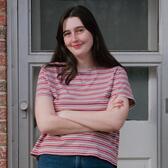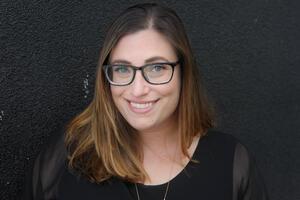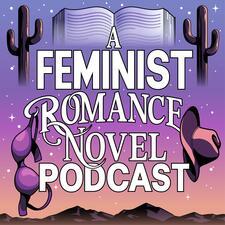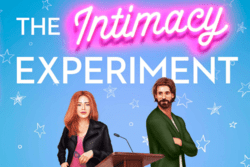Q & A with Leah Berkenwald, Co-Creator of "A Feminist Romance Novel, Podcast!"
JWA chats with Leah Berkenwald, co-creator of the new audio-drama, A Feminist Romance Novel, Podcast! Temptations at Sweetwater Creek.
JWA: Tell us about your new audio-drama.
Leah Berkenwald: A Feminist Romance Novel, Podcast! Temptations at Sweetwater Creek is a labor of love that my co-writers, Benjamin Sandler and Sam Aguirre, and I have been working on for a solid decade. The podcast is a professionally produced audio-drama recorded with a full cast. I won’t give you any spoilers, but here’s a synopsis:
Our story begins when Charlotte Finkelstein’s car breaks down in Texas during a cross-country road trip with her friends April and Polly. After taking refuge at the Sweetwater Creek Ranch Inn, Charlotte and her friends meet Jack, a rugged cowboy so attractive you might overlook his toxic masculinity; Luke, a sexy innkeeper searching for a meaningful connection; and Dylan, a mysterious guest who may or may not be a vampire. Driven by a narrator obsessed with romance and happy endings, our three friends are whipped into a frenzy of sex, doubt, and betrayal.
You should also be aware that this show is first and foremost a comedy. And since it's a comedic parody of romance novels, you can bet it’s not appropriate for children.
JWA: Why was the format of a podcast audio-drama appealing to you?
LB: A Feminist Romance Novel, Podcast! was adapted from its first iteration as a stage play, A Feminist Romance Novel, Live! Producing a live show is expensive, and so we ran an Indiegogo campaign to make it happen. We were humbled to raise enough money to pay our actors and director. The play premiered in March 2019, with five sold-out shows at ImprovBoston (RIP) in Cambridge, MA. It was an incredible experience to share our work with so many people. But then it was over, and we weren’t able to share it with folks who couldn’t attend in person. We knew we wanted to adapt the show to an audio-drama so that we would be able to share it with the world (and listen whenever we’re feeling sentimental). Podcasts are unique in that they are a relatively accessible medium to produce and consume, and I hope we’ll continue to write for this platform in the future.
JWA: What’s it like to co-write as a group, and what has made your collaboration meaningful?
LB: There’s a reason it took us a decade to write this show. Ben, Sam, and I only write when all three of us are together, like a minyan. For the past ten years, we got together to write once a week, most weeks. We wrote every sentence together, and as a result, every scene has all three of our voices in it. I can’t even remember who came up with which joke. It may not have been the most efficient strategy, but it provided a treasured connection point for the three of us that kept us close through out-of-state moves, new babies/puppies, and Covid.
JWA: What drew you and your co-writers to tackling a feminist take on the romance novel?
LB: Back in the day, our friends would buy paperback romance novels at the grocery store and read them aloud in funny voices at parties (Harvey Fierstein was a favorite). It was funny, but we couldn’t believe how misogynistic and sexist some of these stories were. That was the genesis of the idea. We initially thought we would write a short sketch, but there was so much there to play with that it turned into a three-act play.
JWA: Are there any Jewish values that influence your creative work?
LB: What’s more Jewish than comedy? As an improv kid from Brandeis University, comedy and Jewishness intersect for me on multiple levels. A community founded on Jewish values nurtured my interest in comedy. Comedy is where I made my closest friends, many of whom are Jewish. I’d like to think I follow in the footsteps of funny Jewish women before me, like Fanny Brice, Sophie Tucker (who will always remind me of my grandma Frances), Gilda Radner, and so on. A Feminist Romance Novel, Podcast! isn’t specifically focused on Jewish themes, but like many Jewish women comedians, it’s raunchy, pushes boundaries, and questions the status quo. I also imagine many Jewish women can relate to the protagonist, Charlotte Finkelstein, a high-achieving perfectionist with a crippling fear of failure.
JWA: Did you learn anything new or surprising about the romance genre throughout this process?
LB: We learned that there is a fantastic and diverse body of feminist and progressive romance literature out there, and that it goes much broader and deeper than what we had seen in the paperbacks we read at parties. It’s significant that we call our show “a” feminist romance novel, not “the” feminist romance novel, because we are grateful to be joining a growing community of writers expanding and reinventing the genre.
JWA: What do you hope audiences will take away from listening to A Feminist Romance Novel, Podcast!
LB: I hope A Feminist Romance Novel, Podcast! will make you laugh. I hope you’ll enjoy getting to know the characters we’ve come to love so much over the years. I hope you’ll enjoy the robust listening experience created by our sound engineer, Jonah Garcia (another Brandeis improviser). I hope you’ll consider that romantic relationships are not always the most important relationships in a story—or a life. I hope you’ll be inspired to tell your own stories, truth or fiction. I hope you’ll subscribe to the podcast, share it with your friends, and follow us at @catstache on Instagram and @catstacheproductions on Facebook.
But most of all, I hope you laugh.
You can listen to A Feminist Romance Novel, Podcast! on Spotify, Apple Podcasts, or Amazon Music, and you can visit Catstache Productions to learn more about Leah and her team.








